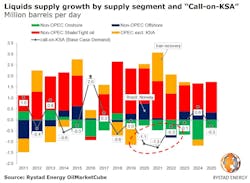Offshore staff
OSLO, Norway– As oil prices approach $70/bbl, Rystad Energy expects that a short-lived price rally through the first half of 2020 will then lose momentum and be replaced by a need for additional production cuts by Russia and OPEC.
Bjørnar Tonhaugen, Head of Oil Market Research at Rystad Energy, said: “We retain our bullish stance for the second half of 2019 and first half of 2020 as we anticipate OPEC+ to extend production cuts through 2019, while we also expect bullish oil market effects due to the introduction of IMO 2020 regulations on sulfur content in marine fuels.”
He added: “However, the effects of the IMO 2020 ‘scramble’ will likely be short-lived. By 2021 there will be renewed pressure on Saudi Arabia andOPEC+ to cut production again or risk a new down-cycle in oil prices.”
US shale production is causing a “recurring dilemma” for the OPEC countries, according to the consultant.
“We tentatively expect a correction in prices, possibly already from the second half of 2020 and into 2021, as the IMO effect fades,” Tonhaugen said. “Nevertheless, the biggest issue is the ability of the US shale industry to grow by 1.4 MMb/d annually between 2020 and 2025 in our current base case, which is enough to keep up with global demand, causing a recurring dilemma for Saudi Arabia and OPEC.”
The consultant forecasts that the upcoming IMO 2020 sulfur limit regulations for marine bunker fuels will have short-lived consequences for the world’s oil markets.
It concludes that despite around 2,800 vessels having so-called scrubbers installed on average in 2020, and refiners gearing up and readjusting to meet the increased low sulfur fuels demand (LSFO, MGO) while also getting rid of most of the high sulfur fuel oil (HSFO) currently produced, there will still be a significant 0.6 MMb/d deficit in marine gasoil in 2020.
“We estimate that global gasoil/diesel demand growth in 2020 could reach 1.7 MMb/d, 1.4 MMb/d of which is from marine bunkers, almost six times the five-year average global gasoil growth,” Tonhaugen said.
He added: “This could have reverberations for the whole fleet of diesel-driven vehicles. Global diesel prices – also at the pump – could be higher in 2020 than many expect.”
04/04/2019



